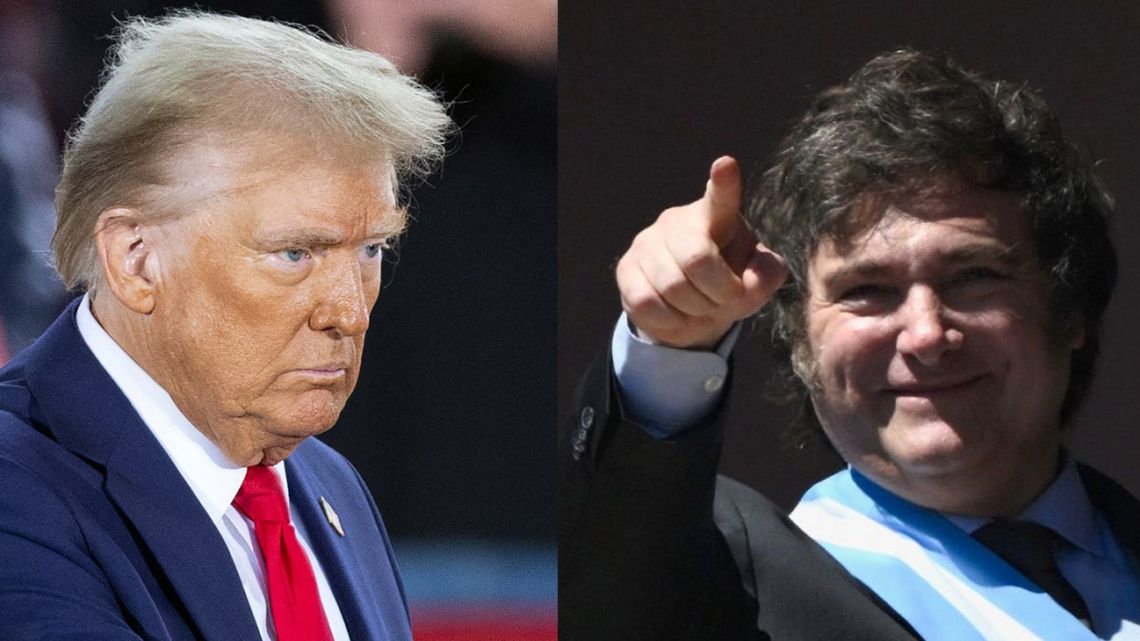
Javier Milei will have been praying to the forces of heaven during this Tuesday night for Donald Trump’s victory, which ended up occurring with an advantage somewhat greater than that predicted by most of the polls (which suggested a technical tie). However, It is not clear that the result brings benefits for the liberal administration beyond political alignment within the international right.
The Argentine Government speculates that the future North American president will intercede again in the FMI so that they arrive new dollars to the country, but the original 2018 credit was already unpayable and led Macri’s government to failure. Will they be willing to take more risks by expanding the credit? Furthermore, the Republican candidate had as one of his campaign axes the rise in import tariffs in general and especially to China What would it mean for Argentina? if Trump put this guideline into practice?
The international panorama is different from that of 2016 When Trump began his first term, the war in Ukraine, the ongoing genocide at the hands of the state of Israel, tensions with China and a global economy that has not recovered from the blow that occurred during the pandemic, pose challenges that are difficult to solve for the establishment US. When he takes office on January 20, it is difficult to imagine the Republican administration giving priority to Milei’s wishes.. Even more so if we take into account that the original plan of the IMF credit was to achieve the reelection of Macri, who not only lost the elections, but also unleashed a debt crisis that remains latent to this day.
Even if Milei’s constant praise of the president-elect and his apparent friendship with Elon Musk (who was a key supporter in the Republican campaign) allow him greater access to dialogue, Trump can hardly guarantee the entry of dollars by himself. Although the United States has a central role in the IMF, European countries, Japan and even China have decision-making power within the organization. Why would they support a new program with an over-indebted Argentina and the Central Bank selling dollars at a low price?
Argentina immersed in the trade war?
In his speech early this Wednesday, Trump once again took aim at China by saying “they don’t have what we have.” The North American magnate took an important leap in the trade war with China during his first term by raising tariffs on products from that country and then Biden increased them again. Trump campaigned stating that it will finance a reduction in internal taxes (mostly for the rich) imposing a 10% levy on all US imports and a 60% tax on goods from China.
Just as Milei promised to dollarize and burn the Central Bank, Trump had also promised to reindustrialize the United States in his previous campaign, all events that have not happened. This makes it unpredictable what the real measures of the future Republican administration will be, but it does It is a possibility that the trade war with China and protectionism will intensify. A scenario of these characteristics would pose two central problems for Argentina: greater difficulties in refinancing external debt and in growing export revenues.
An increase in tariffs on imports in the United States could stop the decline in inflation that has been allowing the North American Federal Reserve (FED) to reduce the reference interest rate. The new taxes would impact the prices of the products that workers must buy to survive, putting upward pressure on inflation. The FED’s policy is usually to raise the interest rate in these cases, as it already did in the post-pandemic period, or at least not to continue its decline (although changes cannot be ruled out if the relationship with Trump becomes conflictive again, as during his presidency. first term). This rate is also the floor for the cost of international loansa key factor for the debt restructuring with vulture funds and bondholders that Caputo wants to face to avoid a new outbreak of the external debt crisis.
At the same time, the reactions of the rest of the world to greater protectionism in the United States may be multiple. One of the possible scenarios is that the appreciation of the dollar against the rest of the currencies and the difficulties in competing as a result of tariffs impact the marketing of commodities (products with low added value with prices set internationally). This could lead to a devaluation in commodity exporting countries to recover ground. Especially for Argentina, a devaluation of the Brazilian real would be worrying, which has already caused strong imbalances in the local economy in the past. Even more so when Caputo’s plan is to maintain a backward exchange rate as a means to continue lowering inflation.
In addition, direct trade from Argentina to the United States could be affected by tariffs; the country has important exports of minerals and meat, among others.
“You know that you can count on Argentina to fulfill your task,” Milei wrote to Trump via the social network “X,” this Wednesday. If the two figures have something in common, it is excessive impulsivity and outbursts in speech, and a pragmatism that is difficult to anticipate, which is why Only two elements seem to be clear: the increase in instability and Milei’s intention to deepen the country’s submission to North American imperialism.
Any “collaboration” between Trump and Milei only implies redoubling national submission. As the revolts against IMF adjustment plans around the world show, imperialism pushes millions into misery, while multiplying struggles against its objectives. It is key to fight to force the CGT and the union centers to abandon the truce and a path of struggle that ends in the general strike until defeating the adjustment plan of the national government and the International Monetary Fund.
Source: www.laizquierdadiario.com

